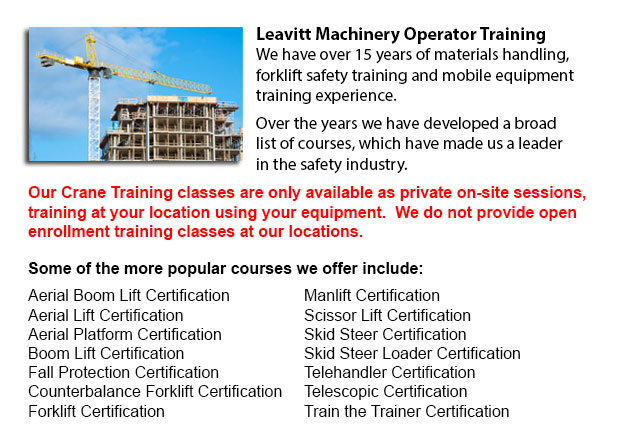
Langley Crane Operator Certification - The process to enable you in order to operate specific kinds of cranes is to take crane operator certification training to receive certification. The certification process comprises classroom learning, hands-on practice and an aptitude assessment. A variety of training programs are existing for overhead cranes, mobile cranes, forklifts, boom trucks, tower cranes and other hoisting machines. Trainees will learn the fundamentals of equipment characteristics, safety, and operational practices associated with these kinds of cranes.
Customized Practical Training and Evaluation:
The on-site practical training and evaluation could be customized by each business after the in-class session. At any time, two operators would be trained by an instructor. The duration of time considered necessary for training would vary depending on equipment kind and the employees' levels of ability, but usually needs an hour or two. The training would center on practical skills such as correct rigging practices, safe operating procedures and planning the lift. Employers must schedule the on-site session earlier.
The training individual would receive an individual wallet certificate, whereas the company gets a wall certificate following finishing the in-class instruction, practical operating instruction and assessment, and written examination. To get certification, trainees must have an 80 percent passing score on both practical and written exams.
Included in the crane operator certification program is the following: Instruction manuals, policies and regulations; hazards of high voltage; safety issues; emergency rescue procedures; signals and communications; pre-operational inspection; types, components and terms; crane capacity and configuration; pre-lift planning and set-up; hammerhead / luffing jib crane operations; wire rope and rigging; fall protection; climbing cranes; crane maintenance; First-aid & CPR; and WHMIS.
The minimum prerequisites for becoming an overhead crane operator include possessing the mental and physical capability required to carry out crane work. Basic capabilities include depth perception, normal field of vision, manual dexterity, reaction time and coordination. Potential operators must not have the tendency to become lightheaded. Operators who do not already have proof of experience and qualifications must achieve certification. Operators should be qualified to be able to operate the specific kind of machine which they will be utilizing to do their work.
-
Operator Safety Certification | Re-Qualification Certification | In-House Instructor Certification in Langley
Lift trucks are utilized in nearly all warehouse operations and in boat yards and in industrial construction sites. The reach feature of a forklift is a vital component used in several applications like for example whenever a shelving system is being... More -
Skid Steer Loader Certification in Langley
The engine powered skid-steer loader consists of a small and rigid frame, equipped along with lift arms that could connect to numerous industrial attachments and tools to carry out several labor saving jobs. Normally, skid-steer loaders are four-whee... More -
Langley Forklift Training Classes
Langley Forklift Training Classes - Forklift are heavy pieces of industrial machines that are utilized in transporting and the handling of merchandise and materials. They are often known as Lift trucks and are found in all kinds of industries. Employ... More -
Langley Heavy Equipment Operator Certification
Langley Heavy Equipment Operator Certification - The heavy equipment operator is an individual who manipulates the controls and drives various kinds of big machinery. Heavy machines is most commonly used on construction sites in order to deliver supp... More -
Langley Crane License
Langley Crane License - Crane operators ought to be "credentialed", which means they ought to own a crane operator license or certification. Credentialing is considered a mandatory governmental prerequisite to be able to practice as a crane operator.... More -
Langley Forklift Training School
Langley Forklift Training School - Forklift Training School And What It Truly Has To Provide - Industry and federal regulators have established the criteria for forklift safety training according to their current standards and regulations. People wis... More -
Langley Boom Lift Certification
Langley Boom Lift Certification - Elevated work platforms allow maintenance operations and work to be performed at heights that can not be reached by whichever other way. Workers utilizing boom lifts and scissor lifts could learn how to safely operat... More -
Langley Manlift Safety Training
Langley Manlift Safety Training - Manlift operators need to be cognizant and aware of all the potential dangers which are connected with specific classes of scissor lifts. They have to be able to operate the scissor lift in a way that protects not on... More

Forklift Certification Langley
TOLL FREE: 1-888-254-6157
Langley, British Columbia
forkliftcertificationlangley.com
Email Us
About Us


